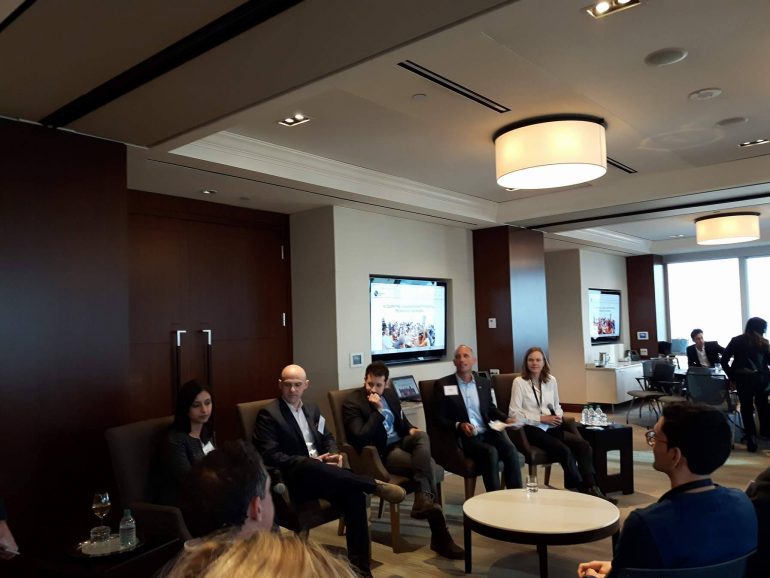In a room filled with some of Toronto’s top founders and leaders of post-seed, pre-series A tech companies, The Entrepreneurship Society (TES) hosted an event featuring a panel, a fireside chat, and roundtable discussions.
Hosted at Blake’s Law in downtown Toronto, the theme of the event was fundraising. In particular, conversations focused on the advice that “other founders and VCs wouldn’t publicly tell you,” notes TES founder Billy Hennessey.
Between the panel discussion and the fireside chat, speakers featured were in two categories: entrepreneurs: Liran Belenzon, CEO of BenchSci, and Rasha Katabi, co-founder and CEO of KREDITshare; and investors: Janet Bannister, general partner of Real Ventures; Jamie Rosenblatt, associate at Golden Ventures; Neha Kera, partner at 500 Canada; and Christian Lassonde, founder and managing partner of Impression Ventures.
Stories mean more than financials
“Don’t customize your pitch,” said Belenzon during the first panel. “It’s crucial to know your story and stick with it… You need a good story and momentum more than you need detailed financials if you expect to raise VC money.”
Much of the room nodded in general acceptance to this comment, but some people – including the VCs on the panel – were a tad confused by this statement. For one, it was odd coming from a CEO of a company, but the context is important here.
At the earliest stages of fundraising, your financials are largely guestimates and are subject to change as the business pivots. What won’t change, however, is that early-stage VCs don’t invest in businesses; they invest in growing, coachable teams.
“A company that presents like they are reading a textbook is not going to win investment…because they were unable to engage people in their solution.”
“It’s easier to invest in a movie than a photograph,” chimed in Bannister, explaining that she likes to see the founding team grow their skills, take feedback, implement it, and show that they can affect positive movement in the company. “When we invest, we look for a good business and a good team. Business is about having a well-defined problem with a solid understanding of how painful that problem is to consumers and a clear vision for the solution. Team is all about seeing movement and proving coachability.”
“A company that presents like they are reading a textbook is not going to win investment not because they don’t have a good product, but because they were unable to engage people in their solution and communicate their value proposition,” Rosenblatt added.
After all, added Belenzon, “You’re building a solution, not a business model.”
VCs lie
if you’ve ever tried to raise funds for a company, then you’ve heard some version of this response from investors that you eventually found out was a polite decline: “We love this, it’s just a bit early for us,” “It’s not a sector we usually invest in,” “It’s not the right time for our fund, et cetera.”
Many founders take this as a positive sign – they are interested in you and it’s just a matter of time! For Bannister, the opposite is true. Belenzon calls it outright lying, as VCs skirt the ‘real’ reasons they are not investing in you.
Knowing that VCs can give responses like this, Bannister advises all her startups to believe that “It’s a no until it’s a yes,” a far cry from the sales rhetoric of ‘it’s not a no until it’s a no.’
But are VCs just cold-hearted, horrible liars who enjoy taunting startups with false hope? The VCs in the room would say hopefully not.
Overall, says Kera, “We can’t tell the future. Your company might be a great investment in a few months. That being said, VCs also try to respect the fact that this business is the founder’s livelihood and their passion. Baselessly shooting it down isn’t helpful or respectful.”

Giving feedback, though, is part of the process and shows respect to both parties, as Rosenblatt mentioned in his answer. Golden Ventures sees itself as having a unique view in the market, meaning that when it turns someone down, they try to give pointed feedback about why they said no and what they would need to see in order to be interested – a philosophy that 500 Canada shares, according to Kera.
However, Golden is not in the business of being prescriptive with feedback and telling founders exactly what to do. They are not mentors to companies they don’t invest in, and further to that, “You’re the founder, and ultimately you have to make the decisions that are right for your company,” says Rosenblatt.
Don’t overspend, because you probably won’t get a Series A
During the first panel, Bannister, Kera, and Rosenblatt outlined a few key metrics that a company will need to be seriously considered for Series A, namely: cost of customer acquisition (CAC), customer acquisition process (CAP), customer lifetime value (LTV), and your monthly recurring revenue (MRR).
The main challenge, however, is that the required MRR to be taken seriously for a Series A has nearly tripled – from about $100k MRR to $250-$300k MRR, says Bannister.

Why? Series A rounds are getting bigger, more focused (so there are fewer cheques being written overall), and earning $100k MRR is not a high enough number to properly de-risk the bigger investment, says Kera.
When the subject of Series A fundraising came up during the second panel, however, KREDITshare founder Katabi was singing a different tune.
“Don’t overspend your money – founders can waste a lot of money that is unnecessary for growth,” she warned, which seemed to imply that a well-managed company won’t feel the need to run for a Series A, but can look for one when it’s a truly beneficial next step.
This, of course, is not to say that founders should not make strategic investments or take risks to test an assumption. Instead, Katabi was hinting towards frivolous spending that is not necessary for growth, no matter how good it makes the team feel in the short term.
In your fundraising and spending expectations, both the panel and the fireside agreed that the founding team needs to be frugal, not frivolous, and think about fundraising as a business tool.
“Think about what milestone you need to hit and how much cash it will take you to get there,” explained Kera.
Almost never cold call a VC
One of the more interesting debates was whether cold calling VCs was effective. Belenzon did it when he was raising for BenchSci, but Katabi was against anything but warm introductions from networks when it came to fundraising.
Rosenblatt and Lassonde chimed in from the VC side of things, both acknowledging that it’s not a completely shut door, but it’s an incredibly tough sell.
“There’s a 1 in 1,000 chance I will respond to a cold email from a founder asking me for coffee. There is a 100 percent chance that I will take a coffee if it’s based off an introduction from one of my portfolio companies,” Lassonde explained. “So if you [founders] want a coffee with me or any other VC, your best bet is to get to know our portfolio companies, build relationships with them, and when the time is right, ask for an introduction.”
“We did have one deal come through a cold LinkedIn message that led to a huge exit,” added Rosenblatt. “but most of the time we operate on warm intros.”

